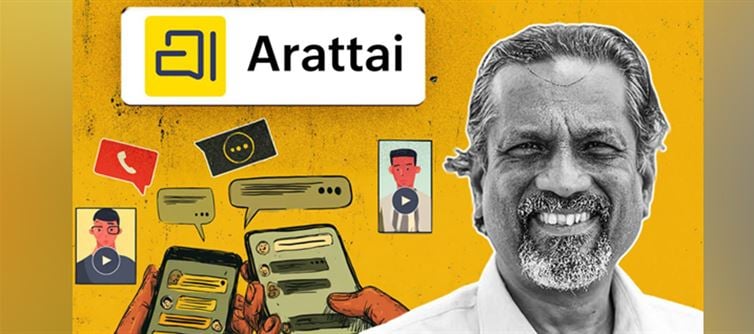
⚡ FROM TOP OF THE CHARTS TO OFF THE GRID
Two months ago, it looked like India had finally found its whatsapp alternative.
Zoho’s Arattai hit #1 on the App Store in september 2025, briefly dethroning whatsapp and Signal. Screenshots flooded social media, politicians endorsed it, and tech circles buzzed with patriotic glee: “An indian app challenging Big Tech!”
Today? It’s gone.
As of November 4, 2025, Arattai sits at #105 on google Play and #123 on the App Store, according to Sensor Tower data.
In less than 60 days, it went from a viral darling to a wallet PLATFORM' target='_blank' title='digital-Latest Updates, Photos, Videos are a click away, CLICK NOW'>digital ghost town.
And that, right there, is the ruthless lesson of network effects — once whatsapp owns 95% of India’s chat graph, you can’t just build an app.
You need a revolution.
📉 CHAPTER 1: THE 60-DAY SLIDE
In september, Arattai’s rise felt meteoric.
It promised privacy-first messaging, backed by Zoho’s trusted brand, and came with subtle nationalistic undertones — “India’s own messenger.”
But what began as a movement fizzled into a moment.
By november, installs plummeted, daily active users cratered, and retention evaporated.
What happened?
Reality.
The spike wasn’t organic. It was political.
When bjp leaders, ministers, and bureaucrats started tweeting from Arattai handles, users jumped in — not out of curiosity, but out of FOMO.
But here’s the problem with hype-led onboarding:
People install out of excitement, not habit.
They leave out of boredom.
🧠 CHAPTER 2: THE NETWORK EFFECT NIGHTMARE
Messaging isn’t a product. It’s an ecosystem.
You don’t join a chat app because it’s better. You join because your people are there.
That’s the brutal truth that no engineer or nationalist campaign can code around.
WhatsApp’s network effect is practically impenetrable — it’s the digital address book of India.
Family groups, school teachers, wedding invites, work updates, government alerts — all flow through one green pipeline.
For an alternative to break through, it needs one of two things:
A killer feature (like Snapchat’s Stories or Telegram’s channels), or
A forced migration (like what china did with WeChat or what Musk tried with X).
Arattai had neither.
It had ambition, privacy promises, and… a few ministers.
🧨 CHAPTER 3: WHEN VEMBU PLAYED THE hero CARD
For a while, Sridhar Vembu was hailed as the anti-Silicon-Valley visionary — a rural entrepreneur, self-reliant, building ethical software from tamil Nadu’s heartland.
And then, politics happened.
When Arattai started getting public nods from bjp leaders, it looked like a boost.
But instead, it boxed the brand into a political corner.
The narrative shifted from “India’s messenger” to “the bjp messenger.”
In a hyper-polarized country, that’s instant death for mass adoption.
The app became a political identity, not a communication utility.
And once the campaign heat faded, so did the installs.
💬 CHAPTER 4: PRIVACY SELLS… UNTIL people REALIZE THEY DON’T CARE
Arattai’s big pitch was privacy.
End-to-end encryption, data stored in india, zero ads, no trackers — it ticked all the right boxes.
But here’s the irony: privacy isn’t what keeps people chatting. Convenience is.
Ask users to migrate just for privacy, and they’ll nod in agreement… before opening whatsapp again.
Unless Arattai could offer something tangibly better — faster payments, cooler groups, richer media — the privacy pitch was a polite applause line, not a hook.
Zoho built Arattai for the right reasons.
But India’s mass user base runs on inertia.
To move them, you need magic, not morality.
💼 CHAPTER 5: WHERE ARATTAI GOES NEXT — THE ENTERPRISE PIVOT
All may not be lost.
Arattai’s real market isn’t WhatsApp’s consumers — it’s Zoho’s customers.
Zoho already dominates the SME SaaS space, with tools for CRM, email, HR, and finance.
If Arattai becomes the internal messenger layer within Zoho Workplace — a secure, integrated enterprise chat — it could carve out a sustainable niche.
The B2C dream may have faded, but the B2B future is viable.
In business software, you don’t need 400 million users. You just need 400,000 loyal ones.
🔥 CHAPTER 6: THE KOO COMPARISON — LESSONS FROM HYPE ECONOMICS
Arattai’s crash mirrors another indian startup cautionary tale — Koo.
Remember Koo? The “Indian Twitter”? Backed by ministers, boosted by hashtags, but abandoned when the buzz died.
Both apps mistook visibility for viability.
Downloads for loyalty.
Tweets for retention.
They soared on sentiment, not stickiness.
And the fall, when it came, was fast and final.
💣 CHAPTER 7: THE HARD TRUTH — YOU CAN’T TREND YOUR WAY INTO HABIT
Every new messaging app in india faces the same paradox:
To win users, you need users.
And to get users, you need to have already won them.
That’s why even giants like Google (Allo, Duo) and Samsung (ChatOn) failed to dethrone WhatsApp.
Arattai wasn’t a bad product.
It was a misread market.
It tried to replace a habit people never wanted to break.
⚔️ FINAL WORD: THE CHAT THAT WENT SILENT
Arattai means “conversation” in Tamil.
But right now, the conversation has moved on.
It started as a dream of wallet PLATFORM' target='_blank' title='digital-Latest Updates, Photos, Videos are a click away, CLICK NOW'>digital sovereignty.
It ended as a cautionary tale in app economics.
Still, credit where due — Zoho tried. It dared. It built. It launched.
In a space where most indian tech firms only tweet about “Atmanirbhar,” Zoho actually built something.
But as the dust settles, one truth echoes through India’s wallet PLATFORM' target='_blank' title='digital-Latest Updates, Photos, Videos are a click away, CLICK NOW'>digital corridors —
You can’t out-patriot WhatsApp. You can only out-innovate it.
And that’s a chat india is still waiting to have.




 click and follow Indiaherald WhatsApp channel
click and follow Indiaherald WhatsApp channel